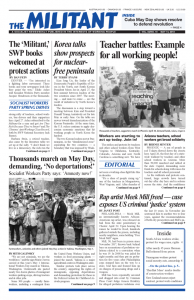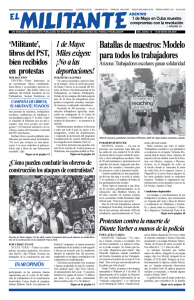The strikes and protests by teachers and other school workers from West Virginia to Oklahoma, Kentucky, Colorado, Arizona and now North Carolina is something new. We have not seen a working-class fight like this in decades.
“It’s a class of people rising up,” one of the teachers in Morgantown, West Virginia, said. After decades of economic contraction and attacks by the capitalist rulers and their political parties in Congress and state legislatures, workers are saying, “Enough!” They are setting an example of how to fight, not just for themselves, but for the working class as a whole, and how to do so effectively.
The capitalist class tries to convince us that “education is about ensuring that your family’s children have the best shot at getting ahead in the lifetime struggle of each against all,” Jack Barnes, national secretary of the Socialist Workers Party, points out in the introduction to the pamphlet The Working Class and the Transformation of Learning.
Barnes approaches education from the opposite perspective, a working-class point of view. He says it has to be looked at as a “social question. As the fight for the transformation of learning into a universal and lifetime activity.”
The pamphlet presents this fight as part of preparing workers and farmers “for the greatest of all battles in the years ahead — the battle to throw off the self-image the rulers teach us, and to recognize that we are capable of taking power and organizing society, as we collectively educate ourselves and learn the exploiters in the process.”
The only way to move forward is to organize independently of the capitalist politicians, Democrats and Republicans alike. We can only rely on ourselves and our fellow workers.
The ruling class doesn’t need workers to be educated. This helps explain why funds for schools are at the bottom of their priorities. They want workers who are obedient. Despite the best efforts of teachers, Barnes points out, “schools under capitalism are not institutions of learning but of social control, aimed at reproducing the class relations and privileges of the prevailing order.”
In West Virginia and Arizona teachers say with pride that students have learned more from the walkouts, the mobilizations, the discussions and organization than anything they get in the classroom.
The Cuban Revolution is a living example that something different is possible. Fidel Castro and the July 26 Movement viewed learning as a social question, a requirement to advance the revolution. One of the first great accomplishments of the revolution — in fact one they began when they were still in the mountains fighting to topple the Batista dictatorship — was the massive literacy campaign of 1961.
Some 100,000 young students from the cities volunteered to live with peasant families in the countryside and teach them to read and write. Literacy — and culture — are crucial for workers and farmers to wield political power. Both the students and the Cuban people were transformed by the revolution and the campaign. The dog-eat-dog morality of capitalism was dealt a powerful blow.
No one can predict how long the teachers’ uprising will last or how far it will spread. Teachers in North Carolina are planning a statewide mobilization May 16. Join members of the Socialist Workers Party to go and take part. Help get out the Militant, The Working Class and the Transformation of Learning, and deepen the discussion on how the working class can make progress.
Things have changed!

